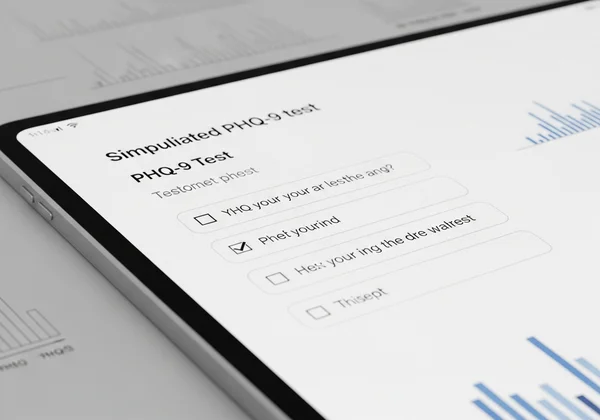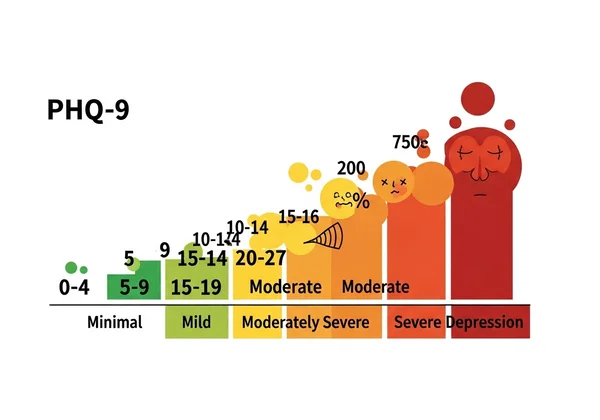PHQ-9 Mental Health Test: Understanding Your Depression Score
July 21, 2025 | By Owen Buckley
Taking the first step to understand your emotional wellbeing can feel daunting, but it's an empowering act of self-care. If you've been feeling down, lost interest in things you once enjoyed, or are just curious about your emotional state, a mental health test can provide valuable clarity. But what happens after you get a score? How to test mental health in a way that truly makes sense? This guide will help you decode the results of one of the most reliable screening tools for depression, the PHQ-9, turning numbers into meaningful insights.
Understanding your mental state begins with one simple step. A free, confidential assessment can be your starting point for gaining a clearer picture of your emotional health. You can take a free test today and receive immediate, private results to begin your path toward empowerment.

What is the PHQ-9 Test & Why Does it Matter?
The Patient Health Questionnaire-9 (PHQ-9) is a widely recognized tool used by healthcare professionals worldwide as a preliminary depression test. It's not just a random online quiz; it's a scientifically validated instrument designed to screen for the presence and severity of depression symptoms. Its importance lies in its simplicity, reliability, and ability to provide a clear, quantifiable snapshot of your mood over the past two weeks.
Think of it as a guided conversation with yourself. The nine questions correspond directly to the diagnostic criteria for major depressive disorder outlined in the DSM-5, the standard classification of mental disorders used by mental health professionals. By answering these questions, you create a baseline to understand your feelings and decide on the next steps in your mental health journey.
The Science Behind Depression Screening: How PHQ-9 Works
The PHQ-9 works by asking you to rate how often you've been bothered by specific problems over the last 14 days. These problems range from low mood and loss of pleasure to changes in sleep or appetite. Each response is assigned a point value (0 for "Not at all," 3 for "Nearly every day"), and the total score indicates the potential severity of depressive symptoms.
This method of depression screening is effective because it standardizes the assessment of common symptoms. It moves beyond a vague feeling of being "unwell" and helps pinpoint specific areas of difficulty. This structured approach provides a solid foundation for tracking changes over time or for having a more informed conversation with a doctor or therapist. Taking a reliable online mental health test can be a great way to begin this process.

Is the PHQ-9 an Accurate Mental Health Assessment?
One of the most common questions is about the accuracy of an online test. The PHQ-9 is considered a highly reliable screening tool for depression. Numerous studies have validated its effectiveness in both clinical and general populations. While it is not a formal diagnosis—which can only be given by a qualified professional—it is an extremely accurate mental health assessment for identifying individuals who may be experiencing depressive symptoms and and could benefit from further evaluation.
The key is to view it as a screening tool, not a final verdict. Its accuracy lies in its ability to flag potential issues, empowering you with the knowledge to seek appropriate support. At MentalHealth Test, our tests are based on these proven clinical scales to ensure you receive trustworthy and meaningful feedback.
Deciphering Your PHQ-9 Score: What the Numbers Reveal
Receiving a score is the first step; understanding what it means is the next. Your PHQ-9 score is more than just a number—it’s a guide that helps you contextualize your feelings. The total score can range from 0 to 27, and it falls into distinct categories that suggest different levels of symptom severity.
It's important to approach your score with curiosity, not judgment. This is information to help you, a starting point for reflection and action. Let's break down what the numbers typically signify.
PHQ-9 Score Ranges: From Minimal to Severe Depression Symptoms
Here is a generally accepted guide for interpreting your PHQ-9 score. Remember, these ranges are for informational purposes and help you understand the potential severity of your depression symptoms.
-
0-4: Minimal or No Depression. Your score suggests you are likely not experiencing significant depressive symptoms. It’s a good sign, but continue to practice self-care and monitor your mood.
-
5-9: Mild Depression. You may be experiencing some mild symptoms. This is a good time to focus on self-care strategies, identify stressors, and consider talking to someone you trust.
-
10-14: Moderate Depression. Your symptoms are likely interfering with your daily life. At this level, self-care is important, but it is strongly recommended to discuss your results with a doctor or mental health professional. You can get your score anonymously to see where you stand.
-
15-19: Moderately Severe Depression. It is very likely that your symptoms are causing significant distress and functional impairment. Seeking professional support is a crucial next step.
-
20-27: Severe Depression. Your score indicates that symptoms are severe and are almost certainly impacting your ability to function. It is essential to seek professional help as soon as possible.

Beyond the Score: Recognizing Common Signs of Depression
Your total score provides an overview, but the individual questions on the depression test are just as important. Look at the specific items where you scored highest. Are you struggling more with sleep, energy levels, or feelings of worthlessness? Recognizing these specific patterns can help you identify tangible signs of depression in your daily life.
Common signs include a persistent sad or empty mood, loss of interest in hobbies, significant changes in weight or appetite, difficulty sleeping or oversleeping, and feelings of guilt or hopelessness. Identifying your specific symptoms makes it easier to find targeted coping strategies.
Your Next Steps After Understanding Your Depression Test Results
Your test results provide the knowledge to make informed decisions about your mental health. Regardless of your score, there are proactive steps you can take. Your journey doesn't end with a number; it begins with a plan.
Practical Self-Care Strategies for Managing Depression
For those with mild to moderate symptoms, integrating intentional self-care can make a significant difference. These are not miracle cures but practical habits that support your overall wellbeing.
- Mindful Movement: Gentle exercise like walking, yoga, or stretching can boost mood-lifting endorphins.
- Balanced Nutrition: A healthy diet can impact your energy levels and emotional stability.
- Consistent Sleep: Aim for 7-9 hours of quality sleep per night.
- Mindfulness and Breathing: Simple meditation or deep breathing exercises can calm the nervous system.
- Connect with Others: Reach out to friends or family. Social connection is a powerful buffer against depression.
When and How to Seek Professional Support for Depression
If your score is in the moderate to severe range, or if your symptoms are making it hard to function, seeking professional support is a sign of strength. A doctor can rule out other medical causes for your symptoms, while a therapist can provide coping strategies, support, and treatment through talk therapy.
Bringing your test results to an appointment can be a great way to start the conversation. It provides a clear, objective summary of what you've been experiencing. Remember, asking for help is the bravest step you can take.

Explore More Free Mental Health Tests
Depression often co-exists with other conditions like anxiety or high stress. Understanding the full picture is key. After exploring your PHQ-9 results, you might find it helpful to take another assessment. Our platform offers a range of free mental health tests, including the GAD-7 for anxiety, to give you a comprehensive view of your emotional wellbeing. Explore our tests to learn more.
Your Mental Health Journey: Taking the Next Step
Knowing your PHQ-9 score can illuminate your path to better mental health. It clarifies what you're feeling, offering a solid starting point. Whether it prompts new self-care routines or encourages professional support, you've gained valuable insight. This is your journey, and you're leading it. Use this understanding to advocate for yourself and cultivate a life that supports your emotional wellbeing. Ready to begin? Our free, confidential mental health assessment is available on our homepage.
Frequently Asked Questions About the PHQ-9 & Depression Screening
How accurate is an online PHQ-9 test for depression screening?
The PHQ-9 is a scientifically validated and highly reliable tool for depression screening. While it is not a substitute for a professional diagnosis, its accuracy in identifying potential depressive symptoms is well-established, making it an excellent first step for self-assessment.
Can a PHQ-9 test diagnose depression?
No, a PHQ-9 test cannot provide a formal medical diagnosis. It is a screening tool designed to indicate the presence and severity of symptoms. A definitive mental health diagnosis test and diagnosis must be conducted by a qualified healthcare professional, such as a doctor or psychologist.
What are 5 common signs of poor mental wellbeing related to depression?
Five common signs include: 1) persistent low mood or sadness, 2) loss of interest or pleasure in activities, 3) significant changes in sleep patterns (too much or too little), 4) fatigue or loss of energy, and 5) feelings of worthlessness or excessive guilt.
How often should I take a depression test like the PHQ-9?
If you are monitoring your symptoms, taking the test every 2-4 weeks can help you track progress. If you are starting a new treatment or self-care plan, it can be a useful way to measure its effectiveness. A free mental health test is always available for you to check in with yourself whenever you need it.
Disclaimer: This content is for informational purposes only and does not constitute medical advice, diagnosis, or treatment. Always seek the advice of a qualified health provider with any questions you may have regarding a medical condition.